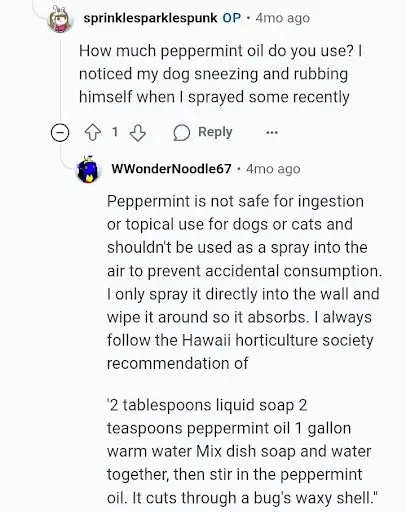How to keep Pests away in Summer
What questions will this article answer?
Why are there more pests in summer?
Ants
From your garden to the rubbish bin to your kitchen, ants will march almost anywhere for their next meal, contaminating your food and surfaces, and spreading germs and diseases as they go. If you happen to step in their path, you may even experience the sharp pain of an ant bite, which can cause swelling if you’re allergic. These bites can be particularly unpleasant if you happen to encounter a fire ant.
Thankfully, there’s several ways to reduce the risk of an ant infestation. We recommend:
- Storing food away in tightly sealed containers and avoid leaving pet food out
- Cleaning your kitchen regularly, wiping surfaces and removing food spills immediately
- Keeping rubbish bins and compost properly covered
- Maintaining your yard by disposing of fallen fruit, keeping the lawn tidy and removing piles of vegetation
- Inspecting your home for all possible entry points and sealing them off
- Applying insecticide sprays and positioning bait stations
If you’re still struggling to combat an ant invasion at home, you don’t need to worry. Allstate has a range of proven treatments for all types of ants. This includes control dust, insecticide as well as chemical baits.
Get fast treatment for crawling insects. Speak to Allstate today.
 or
or
Mosquitoes
That’s why we encourage preventing skin contact with mosquitoes by wearing long sleeved clothing and applying insect repellent.
Although they’re tiny, it’s possible to stop mosquitoes from flying inside your home by:
- Installing mesh screens over your windows and doors
- Removing sources of moisture, including pet water bowls, ponds, bird baths, leaking taps and drains, and making sure that plant pots have adequate drainage
If they’re becoming a major nuisance, Allstate offers a range of professional treatments that target all stages of the mosquito life cycle, as well as fogging sprays and residual barrier sprays for ongoing protection.
Flies
If all this sounds stressful to you, rest assured thatplenty of ways to stop a fly outbreak from happening. Here’s how:
- Install fly screens over doors and windows around your home, paying special attention to kitchen, dining and waste storage areas
- Practice proper food storage to avoid attracting flies
- Keep kitchen and dining areas clean by regularly wiping and disinfecting surfaces, including floors, and clearing food spills, crumbs and grease
- Wash used dishes and cutlery immediately
- Turn on fans
- Apply insecticide spray where it is safe to do so
However, if your fly problem is simply overwhelming, you may need professional fly management. Allstate uses aerosol sprays, fogging and dusting powder to keep flies away for good.
Fleas
Red-brown coloured and around 2mm long, fleas can sometimes be hard to spot, but it’s important to check our pets’ fur for signs of flea infections, look out for flea eggs and droppings, and be aware of changes in pet behaviour.
You can keep your home and pets flea-free by taking the following steps:
- Managing other pests which can introduce fleas to your home, such as rodents and pest birds
- Conducting regular yard maintenance to reduce flea hiding and breeding spots, such as lawns and piles of vegetation
- Regular cleaning, especially in areas are frequented by your pets, including rugs and furniture
- Wash pet bedding using hot water
- Grooming and washing your pets
- Fitting your pet with a flea collar
- Taking your pet to your local trusted vet
For all persisting flea issues, Allstate can assist with flea control dust and insecticide treatments.
Avoid getting bitten by a flying insect problem. Get fast advice today.
 or
or
Cockroaches
With an appetite for a wide variety of food in your pantry as well as rubbish bin, it’s best to keep cockroaches as far away from your home as possible. Here’s how:
- Practicing good hygiene including handwashing
- Ensure that food is tightly covered and stored away
- Clean your kitchen, food preparation and dining areas regularly using disinfecting products
- Wipe up food spills and crumbs immediately
- Keep your cupboards and shelves, oven and dishwasher clean
- Inspect your home for potential entry points inside and seal them over with filler, silicone or expanding foam. Seal off vents if possible
- Check for leaking drains and pipes and fix them as soon as possible
Still struggling with a cockroach problem? Allstate can help. We use a range of innovative control measures including fumigation, cockroach baiting and heat treatments.
Venomous spiders
The good news is, redbacks and funnel webs are not aggressive unless they are disturbed. Here’s how to identify them:
- Redback spiders are 1.5mm long and black coloured with a distinct red stripe on their upper abdomen. They create messy and irregular, but strong and sticky cobwebs
- Funnel web spiders are 1-5cm long, glossy-looking, black-brown in colour and covered with fine hairs. They build non sticky, funnel shaped webs burrows to live in, and hunt for their prey. You’ll most likely find them under rocks, or inside logs.
You can prevent spiders from visiting your home by taking the following steps:
- Identifying and covering all entry points, including vents and cover gaps underneath doors using draught excluders
- Remove clutter from your home so there are less hiding spots
- Reduce the number of insects around your home, which will attract spiders
If you’re concerned about having venomous spiders, we don’t recommend approaching them yourself. At Allstate, our technicians are professionally trained to handle all types of spiders. We offer effective spider treatments such as spider control dust and insecticide sprays to protect you and your family from venomous spiders.
Choose Allstate for reliable and effective summer pest control
The summer holidays are a great time to enjoy time with friends and family, rather than dealing with annoying pest outbreaks.
Locally operated since 1986, Allstate has provided high quality pest control services to homes and businesses in all suburbs of Adelaide. Available 24/7, offer long-lasting pest management solutions to clients in residential, commercial and industrial settings, using a range of safe, modern and innovative treatments.
With access to payment plans and competitive warranties covering all of our services, you can stay pest-free all year round by reaching out to Allstate today.


